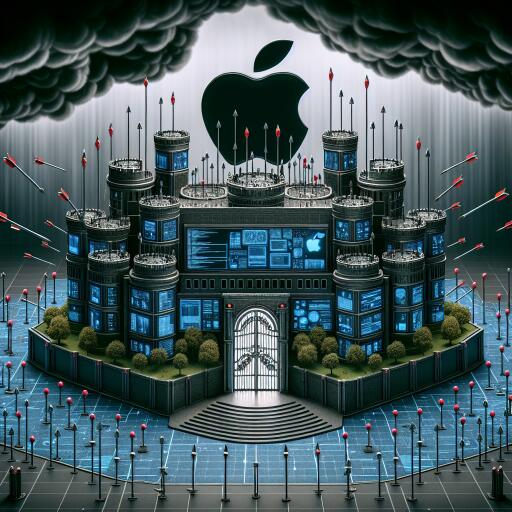Apple Becomes the Latest Tech Giant Under Siege
Apple’s unparalleled standing in the tech industry is unmistakable, embodying a distinct appeal and loyalty that transcends conventional brand attachment. This very identity, deeply ingrained in the hearts of its fervent fanbase, is currently facing a formidable challenge.
The essence of Apple’s allure can be vividly observed through its product launches and the jubilant celebrations that ensue, a testament to its unique charm in the tech world. Picture the scene: a freshly unveiled Apple product, the audience erupting in cheers over each announced feature, however minor. Such is the magnitude of Apple’s influence that customers, beaming with pride, willingly queue for hours, if not days, to be among the first to possess the latest gadget, notwithstanding the hefty price tag attached—case in point, a VR headset priced at a staggering $3,500.
The Apple logo has achieved an iconic status that few corporations can rival, inspiring a level of devotion that sees individuals permanently etching their allegiance through tattoos of the famed fruit emblem. This unparalleled brand love is encapsulated by Leander Kahney’s observation in “The Cult of Mac”: Apple acts as an intoxicating elixir, compelling yet irresistibly alluring.
However, it’s this very “magical experience” that’s now being scrutinized. Apple’s commercial success is undeniable, with its valuation reaching $2.6 trillion. Recent statistics from CCS Insight highlight the dominance of the iPhone, capturing 72% of smartphone purchases in North America during the final quarter of 2023, leaving competitors to vie for the remaining market share.
Central to Apple’s appeal is its emphasis on privacy and security, albeit achieved through practices that have sparked debate. The tech giant’s approach includes blocking web trackers and maintaining a closed ecosystem—referred to as the “walled garden”—where all products, apps, and services are exclusively managed and sanctioned by Apple. This methodology has stirred controversy, particularly among developers who lament the costs and strict regulations enforced by Apple to gain marketplace access.
High-profile disputes with companies like Spotify and Epic Games have highlighted the tensions between Apple and other digital businesses over its practices. Meanwhile, Apple’s main competition, Google’s Android, offers a stark contrast with its more open, albeit perceived as less secure, ecosystem.
The scrutiny is not limited to consumer and developer grievances. Regulatory bodies, most notably the U.S. Department of Justice (DOJ) and the European Union, have taken a closer look at Apple’s practices, questioning the balance between innovation and monopoly. The EU, for instance, has successfully compelled Apple to allow for alternative app stores and adopt more universally accepted hardware standards, like the USB-C port. The DOJ’s efforts, aimed at curtailing potential monopolistic behaviors, represent a significant legal challenge for Apple, marking a rare instance where the tech giant’s practices have been directly contested in the U.S. courts.
Despite these challenges, the notion that Apple’s ecosystem limits consumer choice is contentious. Critics argue that depicting Apple users as devoid of agency oversimplifies the issue. Many users remain loyal to the ecosystem, valuing the convenience and integrated experience it offers. Apple, for its part, remains steadfast in its defense, vowing to contest the lawsuit and deny any wrongdoing.
As Apple girds itself for the legal battles ahead, the tech community and consumers alike watch closely, keen to understand how these developments might impact the landscape of digital innovation and market competition. The unfolding saga serves as a reminder of the delicate balance between fostering innovation, ensuring consumer choice, and maintaining fair competition in the rapidly evolving tech realm.








